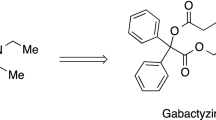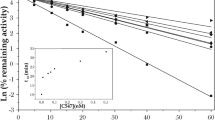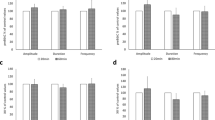Abstract
4-ALKYLDERIVATIVES of 1-phospha-2,6,7-trioxabicyclo[2.2.2] octane-1-oxide (PTBO derivatives) are highly toxic organophosphates. On intraperitoneal injection to mammals they produce tonic–clonic convulsions and death within a few minutes1,2. Their mechanism of action is unknown, but it is different from that of other toxic phosphorus esters which act as inhibitors of cholinesterase1. The symptoms of poisoning by PTBO derivatives indicate an activation of the central nervous system2. There is evidence suggesting that the cyclic nucleotides AMP and GMP act as second messengers in central and peripheral synapses and so we have investigated the effects of PTBO compounds on the level of these nucleotides in the brain. The ethyl (EPTBO) and isopropyl (IPTBO) compounds, two of the most toxic PTBO derivatives, were used. The results show that following intraperitoneal injection of these compounds into rats, the cyclic GMP concentration is increased in cerebellum by both convulsive and subconvulsive doses, whereas the levels of the nucleotide are unchanged in cerebral cortex and subcortical tissues. The increase in cyclic GMP level in the cerebellum is thus not due to the convulsive state.
This is a preview of subscription content, access via your institution
Access options
Subscribe to this journal
Receive 51 print issues and online access
$199.00 per year
only $3.90 per issue
Buy this article
- Purchase on Springer Link
- Instant access to full article PDF
Prices may be subject to local taxes which are calculated during checkout
Similar content being viewed by others
References
Bellet, E. M. & Casida, J. E. Science 182, 1135–1136 (1973).
Casida, J. E. et al. Toxicol. appl. Pharmac. 36, 261–279 (1976).
Wadsworth, W. S., Jun. & Emmons, W. D. J. Am. chem. Soc. 84, 610–617 (1962).
Folbergrova, J. Brain Res. 92, 165–169 (1975).
Weiss, B. & Costa, E. Science 156, 1750–1752 (1967).
Lee, T. P., Kuo, J. F. & Greengard, P. Proc. natn. Acad. Sci. U.S.A. 69, 3287–3291 (1972).
Bowery, N. G., Collins, J. F. & Hill, R. G. Nature 261, 601–603 (1976).
Mattsson, H., Brandt, K. & Heilbronn, E. Abstr. 1st Eur. Mtg. Neurochem, Bath, 21 (1976).
Costa, E., Guidotti, A. & Mao, C. C. in Mechanism of Action of Benzodiazepines (eds Costa, E. & Greengard, P.), 113–130 (Raven Press, New York, 1975).
Mao, C. C., Guidotti, A. & Costa, E. Naunyn-Schmiedeberg's Arch. Pharmac. 289, 369–378 (1975).
Opmeer, F. A., Gumulka, S. W., Dinnendahl, V. & Schönhöfer, P. S. Naunyn-Schmiedeberg's Arch. Pharmac. 292, 259–265 (1976).
Mao, C. C., Guidotti, A. & Costa, E. Brain Res. 83, 516–519 (1975).
Ferrendelli, J. A., Kinscherf, D. A. & Chang, M-M. Brain Res. 84, 63–73 (1975).
Author information
Authors and Affiliations
Rights and permissions
About this article
Cite this article
MATTSSON, H., BRANDT, K. & HEILBRONN, E. Bicyclic phosphorus esters increase the cyclic GMP level in rat cerebellum. Nature 268, 52–53 (1977). https://doi.org/10.1038/268052a0
Received:
Accepted:
Published:
Issue Date:
DOI: https://doi.org/10.1038/268052a0
This article is cited by
-
A review of evidence for GABergic predominance/glutamatergic deficit as a common etiological factor in both schizophrenia and affective psychoses: More support for a continuum hypothesis of ?functional? psychosis
Neurochemical Research (1991)
-
Biological activity as a function of structure. Physicochemical models for bicyclic phosphates
Pharmaceutical Chemistry Journal (1978)
Comments
By submitting a comment you agree to abide by our Terms and Community Guidelines. If you find something abusive or that does not comply with our terms or guidelines please flag it as inappropriate.



